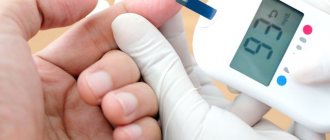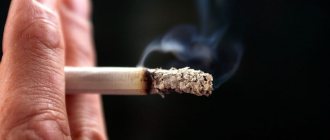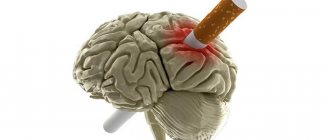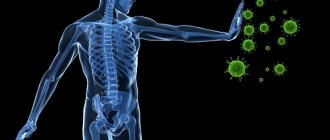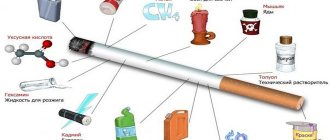Nicotine withdrawal – a condition that occurs as a result of stopping the use of a substance to which there is an addiction (alcohol or drugs), nicotine. There is no such thing as nicotine withdrawal. Every smoker who decides to quit the bad habit faces withdrawal symptoms.
Nicotine addiction
How long does it take for nicotine to leave the body?
Nicotine chewing gum
The effect of nicotine on the body
Use search
Are you having any problem? Need more information? Type in the form and press Enter!
What is nicotine withdrawal
The body's reaction to reducing the dose or quitting nicotine is called nicotine withdrawal.
Regardless of smoking experience, nicotine forms physical dependence. Once in the body, it spreads to tissues and organs.
Under the influence of nicotine, adrenaline and dopamine, the “hormone of happiness,” are released, which causes euphoria in the smoker, improving mood and performance.
Over time, this effect fades and the body requires a dose of nicotine. As a result, the smoker will experience withdrawal symptoms when quitting cigarettes. Its duration and severity vary.
During smoking, systems and organs have become accustomed to working provided they receive a dose of nicotine. The body considers its absence an “abnormal” state and tries to compensate for it - this is how withdrawal syndrome occurs.
The nervous system is affected by nicotine. She suffers from his lack.
Psychological dependence on nicotine manifests itself during the period of quitting smoking. A person falls into a state of stress, depression, and obsessive thoughts appear: “Should I smoke or not?” Physical manifestations will pass in a month, and the psychological attachment to the cigarette will disappear after 2 years.
Take the Attention Test! Find 10 differences! (click right here!)
Test for smokers
How to cope with quitting tobacco and nicotine
We will analyze all the nuances of help in a situation where a person cannot cope with a similar condition when giving up an addiction.
Who should I contact if I have this syndrome?
For some reason, we generally believe that a person simply has to go through this difficult path on his own. There is some truth in this, since motivation, strong desire and will of a person determine 90% of the success of refusal. However, not everyone has an iron character, and sometimes the syndrome interferes with life so much that medical attention is required:
- Therapist. These symptoms are a consequence of the body’s normal recovery processes. However, long-term use of nicotine could lead to real pathologies. The local doctor will identify the suspected diagnosis and refer you for examination and an appointment with a specialist.
- A narcologist can help you choose alternative products with low nicotine content, which will make it easier to get through the period of quitting the addiction.
- A psychologist or psychotherapist is the best choice to cope with depression, irritability, anger and insomnia. For a smoker, mild sedatives like valerian or motherwort are not enough. Sometimes it is necessary to prescribe serious medications - antidepressants. They contribute to the normal production of endorphins and serotonin without the participation of nicotine. In addition, the specialist will tell you how to replace smoking with a healthy activity that brings joy, and will reveal the psychological reasons for the habit.
How to cope with the urge to smoke when stressed?
The main reason for returning to the habit, which people with the syndrome say, is trouble, problems, stress
It is important to understand here that smoking in no way solves anything. And even the relief received is imaginary, since the nervous system is gradually destroyed and it becomes more and more difficult to resist adversity
It is necessary to develop the habit of solving the problem, and not smoking or eating it. Treat this process as an interesting task. Over time, the joy of success, pride in yourself, and resolved troubles will bring much more pleasure than smoking.
This is a huge amount of work on yourself, so to implement it you can turn to the help of a psychologist.
How to avoid gaining excess weight when quitting cigarettes?
The best solution in case of refusal would be to play sports. Firstly, during physical activity, joy hormones are produced, and secondly, it prevents obesity. The main thing at the initial stage is not to choose food as a substitute for nicotine, otherwise you will develop another habit, which is also extremely difficult to get rid of.
Abstinence in the first weeks and days is unlikely to allow you to enjoy sports, so for this period you should choose an activity that will distract you as much as possible, give you joy and a calm state. For some it is a hobby, for others it is a career, for others it is work on oneself.
To moderate your appetite during the syndrome, you can ask your doctor to prescribe special medications. It wouldn’t hurt to watch your diet if you fail, and not put everything in your stomach. It would be better if it were fruits, vegetables and nuts than candy, cookies and fast food.
Nicotine products
To alleviate your condition, you can use patches, tablets, chewing gum and other auxiliary medications with a small dose of the substance. Of course, they will not remove the psychological factor in case of refusal, but they can reduce the manifestations of the syndrome. Unfortunately, there are no drugs that can completely relieve the effects of smoking.
How long does withdrawal last?
How long does nicotine withdrawal last? The peculiarity of nicotine withdrawal is that it occurs a couple of hours after the last cigarette. The duration of nicotine withdrawal ranges from several days to a couple of months.
How long it lasts depends on your smoking history and the number of cigarettes per day. A person who has smoked a pack of cigarettes a day for 10 years will experience withdrawal symptoms for a long time, unlike someone who has been smoking for a couple of weeks.
The symptoms subside after a month, and after one and a half to two years the desire to smoke goes away.
Take the smoking test
How to ease nicotine withdrawal
In many ways, the intensity of nicotine withdrawal depends on the method of quitting smoking. If you smoked a pack or more a day, then you should think in advance about how you can ease nicotine withdrawal. Don’t give up smoking in one day, but gradually reduce the dose and “quit” at the stage when you already smoke 1-2 cigarettes a day.
Sometimes it takes up to six months to reduce the amount you smoke. But this path should be taken gradually, without forcing it, in order to avoid serious physiological problems.
To make your adaptation period easier, you should follow these recommendations.
- Drink plenty of water. This stimulates metabolic processes and helps remove toxins faster.
- In the absence of arterial hypertension and vegetative problems, you can regularly visit the bathhouse or sauna - sweating helps cleanse the body.
- Physical activity helps stabilize the emotional state and accelerates metabolic processes in the body. It is advisable to exercise in the fresh air to increase the supply of oxygen to the blood.
- As replacement therapy, products containing nicotine should be introduced into the diet until the body itself begins to produce it. These products include: eggplants, tomatoes, green peppers, potatoes.
- It is necessary to replenish the vitamin reserve in order to normalize metabolic processes. Increase the amount of fresh fruits and vegetables in the daily menu, drink juices, eat cereals - they have a high fiber content. Detoxification is accelerated by the consumption of dairy products.
- If adaptation is difficult, you need to consult a doctor to prescribe medications. Therapeutic measures help overcome discomfort. To stabilize the nervous system, the following are prescribed: sedatives, antidepressants, antipsychotics, vitamin complexes.
Some smokers try to sleep more to make the first days after quitting smoking easier. They drink tea and go to bed - after all, at night they did not jump up every 40 minutes to smoke. They sleep for 2-3 days and don’t even go outside.
For the body to completely cleanse itself, it takes a sufficient amount of time - from one to three years.
- Oxidation products are eliminated within a day - that is, the level of carbon monoxide in the blood normalizes after 24 hours.
- The smell of tobacco from the mouth completely disappears after 72 hours – if you brush your teeth thoroughly.
- The tobacco aroma disappears from the hair in about a week.
- The activity of the taste and olfactory papillae increases after 3-4 days, and then the appetite increases.
- The blood is cleared after 3 months, and then blood circulation normalizes.
- The functions of the digestive system are restored after 4-6 months.
- It takes the body about a year to cleanse the respiratory system.
How long does full recovery take? The adaptation period takes a different amount of time for each person. If you manage to abstain from smoking for 10-12 years, then we can say that the consequences of smoking have been defeated once and for all.
We managed to survive the first 3 days - the peak of nicotine withdrawal - and not reach for a cigarette, there is a reason to be proud of yourself! We managed to overcome the most difficult time.
https://youtube.com/watch?v=hFjknxr25a0
All rights reserved. When copying materials from the site, you must cite the source.
Symptoms of this pathology
In the process of quitting nicotine, withdrawal syndrome affects the respiratory, cardiovascular, nervous systems, and gastrointestinal tract.
From the first day of nicotine withdrawal, nicotine withdrawal is manifested by symptoms:
- Irritability.
- Aggressiveness and hot temper.
- Anxiety, impatience.
- Weakness, fatigue.
- Thirst, feeling of dry mouth.
- Hand tremors.
- Headaches, dizziness.
- Nausea.
- Insomnia.
- Increased blood pressure, arrhythmia, tachycardia, bradycardia.
- Cough with sputum, shortness of breath, feeling of lack of air.
- Depression.
- Stool disorder.
- Increased appetite.
- The appearance of allergic reactions that appear for the first time.
- Increased sweating.
These symptoms are associated with physical dependence on nicotine and the body’s attempts to improve the functioning of organs and systems. Added to the above is the stress that a person experiences throughout the month.
A positive psychological attitude will help alleviate this condition. If a person wants to quit smoking, then the symptoms will go away easier for him than someone who is forced or forced to do so.
Relief of psychological state
Psychological addiction is more difficult to cope with. This takes more time, and you need to be prepared for it.
During the first weeks, it is recommended to avoid crowds of smoking people and limit alcohol, as it increases the desire to smoke.
In order to keep thoughts about cigarettes to a minimum, you need to be able to switch. A new hobby or hobby will help distract you from obsessive thoughts. It is useful to start walking more. Regular walks in the fresh air enrich cells with oxygen and improve the health of the respiratory system.
Any sport helps normalize the nervous system, helps fight stress and provides the right outlet for aggression. Physical activity improves hormonal levels, stabilizes blood pressure, and trains the heart muscle (heavy smokers have a high risk of cardiovascular disease).
If you are unable to cope with your addiction on your own, you should consult a psychologist. Working with a professional will help you work through the situation more deeply. Smoking is a serious psychological problem; a person does not simply acquire this bad habit. Everything has a root cause.
If you don’t want to spend money on specialists, then there is a lot of literature that is aimed at combating psychological dependence on nicotine. Books can be easily purchased in stores or downloaded online.
To normalize excessive temper and reduce anxiety, taking sedatives (afobazole, valerian, motherwort) will help. It is possible to get rid of psychological addiction, but it will require a lot of time and patience.
brosajkurit.ru
Treatment in a hospital setting
A person is able to endure nicotine withdrawal on his own. If the cough after quitting smoking, neurological and other symptoms intensify, and the general condition is unstable, you should consult a doctor. Against the background of withdrawal, chronic diseases worsen or new ones of an infectious nature arise.
In the hospital, under the supervision of a doctor, medications are prescribed to support the liver, cardiovascular system, and gastrointestinal tract.
If a person has mental problems, then quitting smoking will make them worse.
Do not neglect treatment in a hospital. Here they will prescribe psychotropic substances or antidepressants that will relieve symptoms, improve sleep, improve mood, and eliminate irritability and anxiety.
For complex treatment, restoratives and vitamins are used.
How to eliminate smoker withdrawal syndrome
Smoking withdrawal syndrome can be cured, but first of all, the person himself must want it, try to overcome difficulties and have a firm decision to get rid of the bad habit forever. The most important point in treatment is patience. Doctors recommend distracting yourself, finding something interesting to do, and doing physical exercise and sports. If you have a strong craving for a cigarette, interrupt it with seeds, chewing gum or candy.
If all attempts to quit smoking are in vain, and smoker withdrawal symptoms are severe, it is better to seek help from a professional. A specialist in this field can prescribe special pills that can replace the nicotine required by the body. Such drugs include Tabex, Brizantine, Adaptol and others. If your mental state has noticeably worsened, you need to take antidepressants. In addition, during such a difficult period of quitting cigarettes, nicotine patches and electronic cigarettes are used.
If chronic diseases appear during smoker withdrawal syndrome, you should immediately consult a doctor. You need to undergo a specialized course of treatment under the supervision of a specialist. Some resort to psychotherapy, which significantly alleviates psychological suffering.
Fighting at home
In a normal situation, treatment for nicotine withdrawal is carried out at home.
Treatment methods:
- Psychological mood of a former smoker. A person must have a strong desire to quit smoking. Psychotherapy sessions, group sessions, support from friends and family, and resort to hypnosis help. For sleep disorders, irritability, and depression, sedatives and antidepressants are used.
- The use of drugs that replace nicotine helps to reduce the symptoms of “withdrawal syndrome”. These are patches, tablets, chewing gum, which ensure its entry into the body without smoking. This helps the body rebuild and forms a habit that will replace smoking.
- The use of drugs that do not contain nicotine, but affect acetylcholine receptors. As a result, the amount of dopamine is released that provides the smoker with a comfortable state of health without nicotine. In this case, dependence on the drug does not form.
- The group of drugs based on cytisine also does not contain nicotine. By taking these drugs and continuing to smoke, a person provokes symptoms of nicotine overdose. This makes you quit cigarettes without causing withdrawal symptoms; nicotine is replaced by cytisine.
- As part of complex treatment, procedures such as acupuncture, breathing exercises, and reflexology are used.
- Spend time outdoors, find hobbies. In people who are distracted by something (child, work, pet, hobby), withdrawal symptoms go away with less severe symptoms.
Mitigation methods
Symptoms of nicotine withdrawal need to be addressed comprehensively. If you cannot endure withdrawal symptoms on your own, you should turn to medication. You should set a goal for yourself: “I quit smoking, period.” Until you make the final decision to live with or without nicotine in your blood, there will be no effect. After taking the drugs, the desire to smoke will resume. Treatment of withdrawal symptoms when quitting smoking involves working in 2 directions:
- relief of physical symptoms;
- reducing stress on the psyche.
Fighting physical addiction
To get rid of nicotine withdrawal on a physical level, various drugs are used. Let's look at several options that will help you overcome your addiction.
- One of the most common medications that helps ease withdrawal symptoms is Cytisine. It causes a persistent aversion to nicotine by acting on certain receptors. Before using it, you should definitely consult your doctor. In the first days of quitting smoking, you should take 1 tablet every 2 hours. If after 20 days of taking there is no noticeable effect, it is recommended to stop taking the tablets and resume taking them after 90 days.
- Among the drugs that replace nicotine, Tabex is a popular remedy. For the first 3 days it is taken once every 2 hours. The number of tablets taken per day should not exceed 6 pieces. If a smoker reduces the dose of nicotine gradually and continues to smoke while taking Tabex, the tablets are taken in between smoke breaks. This technique helps get rid of nicotine intoxication.
- Antidepressants are an effective means of reducing nervous tension and eliminating withdrawal symptoms from cigarettes. When quitting smoking, Zyban is prescribed. The active substance of the drug prevents blocking the production of dopamine, which helps relieve discomfort. When the joy hormone is produced, quitting smoking is much easier.
- Vitamins help overcome addiction. Consuming 100 mg of vitamin C per day improves immunity and reduces the negative effects of nicotine. Another component that helps alleviate psychological symptoms is magnesium. Preparations with an active complex of minerals and vitamins indicated for withdrawal symptoms: Magnesium B6, Magnicum, Magnesium B6 anti-stress.
- Constipation is harmful to the body. When waste products are not eliminated naturally, toxins begin to spread into the bloodstream, making withdrawal symptoms worse. When using concomitant medications to improve digestion and enterosorbents, withdrawal symptoms go away faster.
We eat healthy foods
You can overcome cigarette addiction with proper nutrition. By consuming the required amount of vitamins, the body will be able to quickly replace the missing nicotine, and withdrawal symptoms will last much less. Milk quickly cleanses the body of toxins and helps with nicotine intoxication. Recommended products for consumption:
- ginger;
- black chocolate;
- citruses;
- celery;
- parsley;
- broccoli.
We soften the psychological state
Plan your smoking-free day. This will help distract you from the obsessive desire to smoke. When self-treating at home, limiting your social circle with smokers will help relieve withdrawal symptoms. The best time to quit smoking is on vacation, when you are left to your own devices and no one can influence your choice, so the time of fighting addiction will pass faster.
If the smoking period is not too long, it is better to get rid of the lighter, cigarettes, and ashtray immediately. If you have a long history of smoking, it would be better to quit gradually, reducing the dosage of nicotine; a sudden quit is fraught with consequences for the body.
Try to eat less food that makes you want to smoke: fatty foods, alcohol. Introduce herbal teas and herbal soothing infusions into your diet. Regular exercise will help you get rid of obsessive desires. During physical exercise, the brain focuses on monotonous movements, displacing extraneous thoughts and obsessive desires. Caffeine can temporarily replace nicotine. Drink strong tea or coffee in reasonable quantities to reduce nicotine cravings.
You need to accept the fact of your addiction and go through withdrawal. In a month you will feel a surge of strength. Visit Smokers Anonymous groups. Quitting smoking will be easier if you find like-minded people.
Possible consequences of withdrawal
If withdrawal symptoms occur with difficulties, then quitting smoking will cause the following consequences:
- Sleep disorders. Nicotine increases blood pressure. As a result of refusing it, the pressure decreases. This causes the drowsiness that a former smoker experiences. Insomnia is the opposite manifestation of the consequences of quitting nicotine. The psychological attachment to smoking is to blame, which causes stress and depression.
- Problems with the gastrointestinal tract. After quitting nicotine, nausea and constipation occur. During smoking, nicotine affects the organs of the digestive system and the body adjusts to a different rhythm. These problems can be solved by adjusting your diet.
- Cough with sputum. This is a normal phenomenon when quitting smoking. The bronchi become cleared, which causes a cough and dry mouth. Inhalations and breathing exercises will help this process.
- Headache and toothache. Caused by vascular spasms. They occur as a result of nicotine withdrawal. The pain lasts for a couple of days, during which time painkillers will help.
- Skin problems. In the first days of withdrawal, pimples and peeling appear. Skin cells poisoned by nicotine die, and after 2-3 days it will return to normal.
- Weakening of the immune system. Suppression of the immune system due to nicotine use leads to viral and infectious diseases in the first time after quitting smoking. They get sick with colds, stomatitis, and ulcers appear in the mouth or on the lips. Treatment is symptomatic.
- Excess weight. After quitting cigarettes, former smokers replace nicotine with food, because this releases dopamine. It is worth changing your diet and making snacks healthy and low-calorie, forgetting about fast food and other junk food.
Benefits of nicotine withdrawal:
- “Smoker's cough” goes away.
- The sinuses are cleared. The sense of smell returns and shortness of breath disappears.
- Eliminating the smell of tobacco smoke. Hair, hands, clothes, home and car will not be saturated with the unpleasant smell of tobacco.
- The risk of heart disease, oncology and other diseases is reduced.
- Efficiency increases and energy appears.
- The condition of hair, skin, and nails improves.
Alcohol withdrawal syndrome
Alcohol withdrawal syndrome is a complex pathological reaction of the body that occurs in people suffering from alcohol dependence after quitting drinking alcohol.
Withdrawal syndrome can resemble a hangover, but it lasts longer and has a number of additional symptoms. Alcohol withdrawal syndrome will never develop in a person who is not dependent on alcohol. It is not enough to drink alcohol for a week for withdrawal symptoms to develop later. The period of time required for the formation of alcohol dependence varies between 2 and 15 years. At a young age, this period is reduced to 1-3 years.
Most often, there are three degrees of severity of alcohol withdrawal syndrome, which are characteristic of stage 2 alcoholism:
- The first degree of alcohol withdrawal syndrome can be observed after short binges of 2-3 days. In this case, the person experiences increased heart rate, suffers from increased sweating, and dry mouth appears. There are signs of asthenic syndrome with increased fatigue, weakness, sleep disturbances and autonomic disorders (tachycardia, local hyperhidrosis, deterioration of potency).
- The second degree of alcohol withdrawal syndrome occurs after prolonged binges for a period of 3-10 days. Autonomic disorders are accompanied by neurological symptoms, as well as problems in the functioning of internal organs. The following clinical manifestations are possible: hyperemia of the skin, redness of the eyes, increased heartbeat, surges in blood pressure, nausea accompanied by vomiting, heaviness in the head, clouding of consciousness, tremor of the limbs, tongue, eyelids, gait disturbances.
- The third degree of withdrawal syndrome occurs after binges that last more than a week. In addition to somatic and autonomic disorders, psychological disorders are observed, which in this case come to the fore. The patient suffers from sleep disorders and suffers from nightmares, which are often very real. The person’s condition is disturbed, he suffers from feelings of guilt, is in a melancholy and depressed mood. He behaves aggressively towards people around him.
It is also possible to add symptoms that are associated with the functioning of internal organs, since long-term alcohol consumption affects their condition in a negative way.
Resumption of alcohol intake alleviates or completely eliminates withdrawal symptoms. Subsequent refusal leads to an intensification of the clinical syndrome, and also makes the craving for alcohol even more irresistible
Treatment of alcohol withdrawal syndrome is the responsibility of a narcologist. Patients with mild forms of disorders can receive care at home or in an outpatient setting. Hospitalization is necessary for exhaustion, dehydration, increased body temperature, severe tremors of the limbs, the development of hallucinations, etc. Mental disorders in the form of schizophrenia, alcoholic depression and manic-depressive psychosis are also dangerous.
In mild cases, alcohol withdrawal syndrome goes away on its own, on average, after 10 days. The course of severe withdrawal depends on the severity of somatic pathology, mental and autonomic disorders.
Stages of this pathology
Nicotine withdrawal occurs in 3 stages:
- First day. A couple of hours after quitting nicotine, a person begins to feel the urge to smoke. Over time, this desire intensifies, and after 6 hours it is joined by nervousness and irritability. There is a feeling of anxiety and the inability to concentrate on anything. Symptoms appear:
- Decreased appetite;
- Decline in performance;
- Laziness;
- Digestive disorder.
After the first day, either the condition will improve, or the symptoms will intensify and move to the second stage.
- Apogee. It occurs on the second or third day. This is a turning point - many people can’t stand it and start smoking. The body experiences a lack of nicotine, and the psychological dependence that has formed during smoking manifests itself. The person becomes hot-tempered and becomes depressed. After 3 days, the liver resumes producing its own nicotine for the normal functioning of organs. The craving for smoking remains for a long time. It is typical that women endure this stage more easily than men.
- Month. A week after quitting nicotine, the body cleanses itself. Feeling better. By the end of the first month, the body gets rid of physical nicotine addiction, which cannot be said about the psychological aspect. The desire to light a cigarette for a couple of years haunts a person who has given up a bad habit. In the first month of quitting nicotine, the body's immune function decreases, which increases the risk of infectious diseases during this period.
Lifespan
Withdrawal itself is a psychological term, but it is directly related to what happens to the human body. Life expectancy during abstinence depends on the person’s health. Usually people do not die because they are trying to get rid of their habit. Addictions themselves kill people, which becomes the only result of all their hobbies.
The life prognosis is comforting if a person gives up alcohol, nicotine or drugs. The question of how long “former addicts” live can be answered in the same way as the question of how long people live in general.
The most important thing after all operations to get rid of a bad habit is prevention and maintaining a healthy lifestyle. Here relatives and loved ones should come to the rescue. Only sincere communication, understanding and support in difficult situations can help you never experience withdrawal again.
A good preventative measure would be to periodically visit a patient with a psychologist. Your own desire to never use nicotine, alcohol or drugs again is the most important component in recovery. Psychological help is important at the stage when a person again experiences cravings for harmful substances, and also simply wants to speak out and receive useful advice.
It's good if a person has new hobbies. It doesn't matter what exactly he will do. However, having a hobby where he will achieve certain success will allow him to value himself and his life more.
Increasing self-esteem and self-love are important components. The more a person respects and values himself, the less he harms himself. You can’t do this without the support of your loved ones. A favorite activity or job will also help with this. When a person is busy, then he has support.
psymedcare.ru
Manifestation of pseudo-withdrawal syndrome
3-4 months after quitting nicotine, a person experiences pseudo-withdrawal syndrome. In this case, there is a craving to smoke, symptoms are observed, as with withdrawal, they pass in 3 stages. The person becomes depressed.
This occurs due to a sudden disruption in the body, which is caused by a long break from smoking.
The duration of the condition is from a couple of hours to three to four days. The main thing for a former smoker is not to break down and not smoke. Sedatives or herbs, fresh air, and physical activity will help.
Nicotine withdrawal and pseudo-withdrawal syndromes are temporary phenomena and are not life-threatening. A person is able to survive them without help or resort to medication. The result depends on the smoker and his desire to start a life without nicotine.
Share with friends or Save for yourself!
4.5 / 5 ( 44 voices)
How to help the body
To make it easier to quit smoking, you need to help your body. It is necessary to prepare yourself for the fact that it will be difficult to completely quit smoking on the same day that a person makes the decision to do so.
It is important to set a clear goal for which you need to achieve a positive result. Such motivation may be preserving family or health, the desire to conceive a child, play sports and other reasons.
This will make it easier to adhere to smoking rules.
In the first month, it is important to give your body as many vitamins as possible. They can come from both food and special medications.
At the pharmacy you can buy vitamin complexes that promote rapid recovery (for example, Aevit or Multitabs).
To speed up the normalization of skin tone, you can use natural face masks based on honey, egg yolk and milk. They are suitable for both women and men who take care of their appearance.
It is also important to monitor your physical activity. Waste and toxins are quickly eliminated from the body, which receives a sufficient amount of physical activity.
It is recommended to do exercises in the morning, walk, and breathe fresh air as much as possible.
There's no reason to fear withdrawal symptoms
They go away within a couple of weeks and only cause discomfort at the beginning of the throwing process. If the nicotine addiction is too strong to quit on your own, we recommend using the help of a consultant, with whom a method of treating nicotine addiction is selected.
To treat nicotine addiction, both nicotine replacement treatment (nicotine gum and skin patch) and tablet treatment - bupropion and varenicline - are used. The last two drugs are prescription drugs, prescribed by a doctor.

